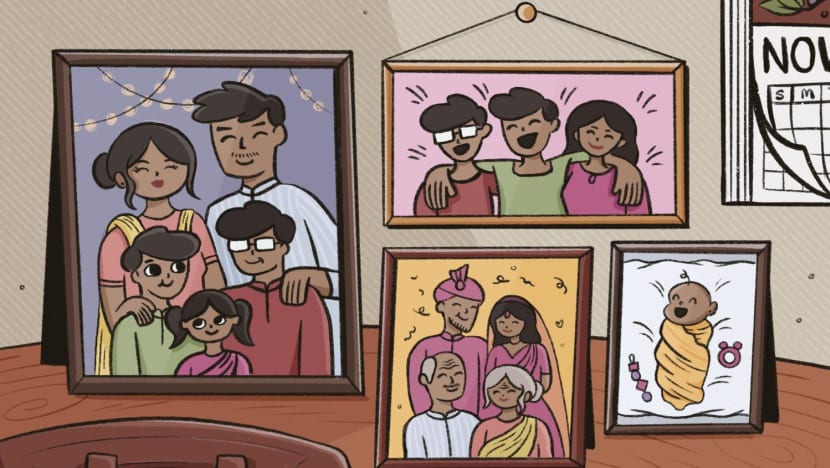Commentary: Having my first child gave me a new perspective on my parents' love for me and my siblings

I always heard the same monotonous refrain from my parents: “Archana, you don’t understand! You’ll only understand when you have your own kids! Believe you me, one day, you surely will!”
I had heard my mother say these words repeatedly, whenever she thought that I was being obstinate, unreasonable or just plain ungrateful.
To be fair to them, my parents were wonderful parents and blessings to my two elder brothers and I. They doted on us and smothered us with their love and affection — to the point where we sometimes almost suffocated.
But then was it not a very wise man who once remonstrated: “No! You cannot love too much! No! No! You must love, and love too much!”
Through the years, my parents remained unwaveringly the same. Even as they grey and age, they are still as attached, concerned and protective as when we were children.
This comes across in high-resolution clarity on feast-days and celebrations, when they insist upon getting us new clothes, gifts of money and sweets even though we are full-grown adults.
Their largesse has now extended to their grandchildren, who are dote upon as only grandchildren can be. My parents would probably have spent days shopping for the right size and fit of traditional Indian outfits — they deem these as being the only appropriate attire for such special occasions.
My siblings and I have long outgrown such sentimentality; we try hard to hide this from them, but they appear obtuse — although I suspect that they are fully aware.
Similarly, they force food upon us at the table though some of us are on self-controlled diets and conscious of our caloric intake for the day. It is not that they are old-fashioned, ignorant of modern trends or out of sync with the contemporary world.
I guess this is the essence of parenthood. It is a primordial force that transcends logic, reason and common-sense; it is an overwhelming emotive response that goes beyond what our education and intellect have made us into.
It is something as ancient as the first morning of the world and it is just as pure and pristine in its outreach and outlook, uncluttered and unpolluted by everything that reason compels us to recognise respect as sane and sensible.
I suspect this is why the safety, security and well-being of their offspring is always paramount to parents, even at their own expense.
I can still recall how my father was deeply affected when my eldest brother, whom I affectionately call “Avin Anneh”, was called up for National Service and was confined to his barracks like all his fellows for the first few weeks.
A strange malaise seized my dad. He became quiet and withdrawn. He would merely peck at his meals. Often, we found him sitting pensively in my brother’s room or rearranging the items that had already been rearranged multiple times before.
Sometimes, he left the house without telling anyone and would return only a few hours later. Much later, we discovered that he had driven all the way from our home in the western part of Singapore to the SAF ferry boarding point at Changi, just to be a little closer to his son in Pulau Tekong.
It was, for all of us, astonishing. We found it hard to believe that a normal, sober and mature man could succumb in such a manner to a short stint of separation from his son. So we left him alone to his madness.
It slowly eased but it did not disappear altogether. When Avin Anneh went to Safti for Officer Cadet School, my father would persuade my mother to drive to the Pasir Laba campus to see if he could see his son doing his PT in the evenings with his platoon-mates!
Likewise, during the judo training camps I attended in secondary school and Junior College, my parents would invariably turn up unannounced just to say hello to me in the evenings, and to deliver special goodies for me and my friends.
Just as handphones were not normally permitted in the camps, neither were parents. But this did not prevent Mum and Dad from sneaking around the vicinity of the camp for the faint chance of catching a glimpse of me. That alone was reason enough for them to make a journey down to wherever I was.
In the short, telescoped sessions of our unpremeditated encounters, I became an expert in spotting them hanging out furtively at the perimeter fences.
I would race to them excitedly before the teachers and instructors saw me, wrap my arms tight around them in a family huddle, laugh and sob simultaneously before bidding them farewell.
But it was not always mushy and gooey goodness. My mother would have made a Tyrannosaurus Rex blush in shame against her potential savagery.
Once, in a shopping mall, the younger of my two brothers, Benjamin, whom we lovingly call Thambs (abbreviated form for thambi or younger brother) was eager to ride on the toy tram that trundled on the lobby floor of the building.
As the tram rattled away from my parents, Thambs suddenly thought he had enough, stood up and tried to clamber out. The rickety old man who operated the train became panic-stricken. He hobbled towards five-year-old Thambs, who was by now hanging upside down and bawling his head off!
The uncle who was completely terrified by the screams of the little boy merely succeeded in twisting his tiny body further.
The shrill screams of Thambs, the plaintive cries of the old man trying to make some sense of the nightmare he had woken up to, the cries of the excited crowd watching the spectacle unfold, all dimmed compared to the roar of my mother as she flew to the scene, leapfrogged the wooden barricade that enclosed the tram tracks and swooped her darling to safety.
It happened in a flash. But then Mum had always been an athlete in school. Of course, the crowd cheered for Mum. I do not know if she took a bow.
Six months ago, I gave birth to my daughter. As any new parent would tell you, my whole world changed instantly. I knew that having a baby would mean many dirty diapers and sleepless nights, but what I had not expected was how my perception of the world would change so much as well.
For one, having a little human totally reliant on me made me truly feel like an adult, for the first time in my life. Learning to drive, securing my first job, paying taxes, getting married or even buying a house — none of these had even come close to that singular experience.
Second, I didn’t think I could feel so many emotions all at the same time. My heart felt like it had grown to fill whatever space my baby had previously taken up in my body.
I have no doubt that hormones and exhaustion played a big part in this, but never had I felt so much love and excitement for the future, while simultaneously feeling vulnerable and terrified about everything happening around me.
Third, during the month I stayed with my parents after giving birth, I found myself seeing them in a whole new light. I was constantly wondering how they must have felt experiencing the same stages as new parents when they were living in New Zealand, without family or close friends nearby.
In between bouts of midnight feeding when I would stare at my baby with admiration — instead of sleeping when the baby slept — I had heartfelt conversations with my mother that I never had since moving out of home.
It was during this time that I came to a beautiful realisation that as my brothers and I were growing up, we were watching our parents grow up too.
The constant shifting of perspectives and the blurring of roles as we subsume new identities is what makes parenthood mysterious and exquisitely beautiful. It is a constant process of self-discovery and self-renewal.
So when my parents look fondly at their youngest child and only daughter holding her own baby and whisper fondly: “See how much she has grown”, I cannot help but believe that it isn’t only their granddaughter they were talking about.
ABOUT THE AUTHOR:
Joanne Archana Bala is currently in the Government Affairs and Public Policy team in Google Singapore and Malaysia. Prior to Google, she worked at Enterprise Singapore for six years, including two in Chennai, India. This piece first appeared in The Birthday Book: Unmasking, a collection of 58 essays on the new individual and collective possibilities for Singapore as we emerge from the throes of Covid-19.











